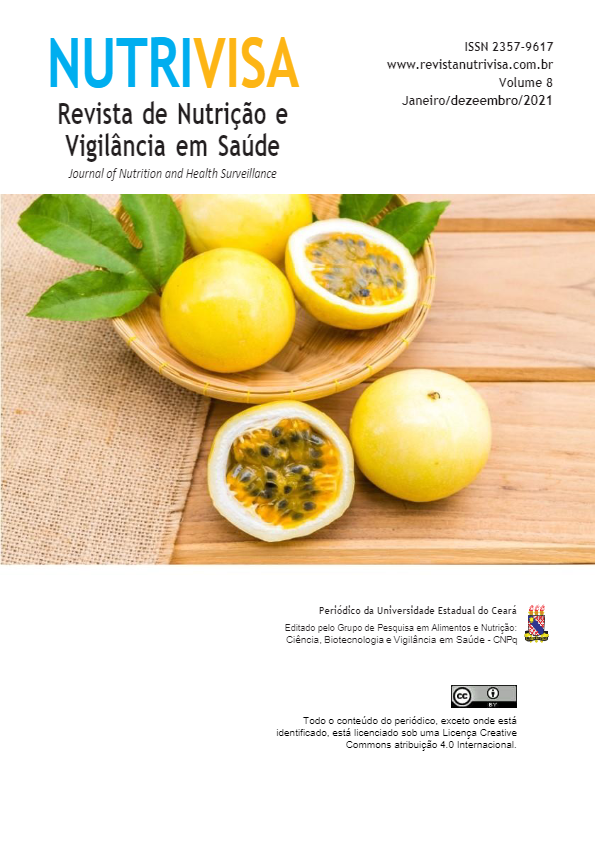Food strategies with carbohydrate reduction for the treatment of type 2 Diabetes Mellitus
DOI:
https://doi.org/10.59171/nutrivisa-2021v8e9931Keywords:
Type 2 diabetes mellitus, Low-carbohydrate diet, Glycated hemoglobinAbstract
Low carb strategy has been studied as an alternative used in the treatment of type 2 Diabetes Mellitus. In this sense, research on the subject is justified because the number of diabetics in Brazil and worldwide has increased epidemically, making the disease a global health priority. Therefore, this research aims to identify and explain the main dietary strategies with low carbohydrate, analyze the impact on treatment and prevention of the disease so that it is feasible to examine the benefits of its use and compare with the tractional strategies used. The 36 reviewed papers classified low carb diets as those with carbohydrate percentages less than or equal to 26% of daily intake or up to 130g/day, and very low carbohydrate as those with up to 50g/day. The information analyzed collaborated to show that the results are effective in controlling glycated hemoglobin, weight loss, fasting glycemia, and reducing the use of medications and providing a better quality of life, but more studies with longer time frames and larger samples are needed to support this strategy, because as William Osler said: "Medicine is the science of uncertainty and the art of probability," and in nutrition it is no different, because science is not exact.
References
ADA. Diagnosis and classification of diabetes mellitus. Diabetes Care, 2014.
BRASIL. Pacientes com diabetes contam com investimentos e cuidados no SUS. Disponível em: <https://aps.saude.gov.br/noticia/10336>. Acesso em: 13 abr. 2021.
DAVIES, M. J. et al. Management of hyperglycemia in type 2 diabetes, 2018. A consensus report by the American Diabetes Association (ADA) and the european association for the study of diabetes (EASD). Diabetes Care, v. 41, n. 12, p. 2669–2701, 2018.
EVERT, A. B. et al. Nutrition therapy for adults with diabetes or prediabetes: A consensus report. Diabetes Care, v. 42, n. 5, p. 731–754, 2019.
AHMED, S. R. et al. Effects of the low carbohydrate, high fat diet on glycemic control and body weight in patients with type 2 diabetes: experience from a community-based cohort. BMJ Open Diabetes Research & Care, v. 8, n. 1, p. e000980, 2020.
BRASIL. MINISTERIO DA SAÚDE. Cadernos de Atenção Básica, n° 36 Estratégias para o cuidado da pessoa com doença cronica- Diabetes Mellitus. [s.l: s.n.].
BRASIL. Pacientes com diabetes contam com investimentos e cuidados no SUS. Disponível em: <https://aps.saude.gov.br/noticia/10336>. Acesso em: 13 abr. 2021.
BROWN, A. et al. Dietary strategies for remission of type 2 diabetes: A narrative review. Journal of Human Nutrition and Dietetics, n. July, 2021.
CAPTIEUX, M. et al. Defining remission of type 2 diabetes in research studies: A systematic scoping review. PLoS Medicine, v. 17, n. 10, p. 1–16, 2020.
CERF, M. E. Beta cell dysfunction and insulin resistance. Frontiers in Endocrinology, v. 4, n. MAR, p. 1–12, 2013.
CHEN, C. Y. et al. Effect of a 90 g/day low-carbohydrate diet on glycaemic control, small, dense low-density lipoprotein and carotid intima-media thickness in type 2 diabetic patients: An 18-month randomised controlled trial. PLoS ONE, v. 15, n. 10 October, p. 1–15, 2020.
FEINMAN, R. D. et al. Dietary carbohydrate restriction as the first approach in diabetes management: Critical review and evidence base. Nutrition, v. 31, n. 1, p. 1–13, 2015.
GARDNER, C. D. et al. Weight loss on low-fat vs. low-carbohydrate diets by insulin resistance status among overweight adults and adults with obesity: A randomized pilot trial. Obesity, v. 24, n. 1, p. 79–86, 2016.
GOLDENBERG, J. Z. et al. Efficacy and safety of low and very low carbohydrate diets for type 2 diabetes remission: systematic review and meta-analysis of published and unpublished randomized trial data. BMJ (Clinical research ed.), v. 372, p. m4743, 2021.
GULDBRAND, H. et al. In type 2 diabetes, randomisation to advice to follow a low-carbohydrate diet transiently improves glycaemic control compared with advice to follow a low-fat diet producing a similar weight loss. Diabetologia, v. 55, n. 8, p. 2118–2127, 2012.
HAACK, A. Fenilcetonúria : diagnóstico e tratamento. Com. Ciências Saúde., v. 23, n. 4, p. 263–270, 2012.
HUNTRISS, R.; CAMPBELL, M.; BEDWELL, C. The interpretation and effect of a low-carbohydrate diet in the management of type 2 diabetes: A systematic review and meta-analysis of randomised controlled trials. European Journal of Clinical Nutrition, v. 72, n. 3, p. 311–325, 2018.
LEAN, M. E. et al. Primary care-led weight management for remission of type 2 diabetes (DiRECT): an open-label, cluster-randomised trial. The Lancet, v. 391, n. 10120, p. 541–551, 2018.
LYRA, R. et al. DIRETRIZES DA SOCIEDADE BRASILEIRA DE DIABETES 2019-2020. SBD- Sociedade Brasileira de Diabetes, v. 5, n. 3, p. 709–717, 2020.
MAYER, S. et al. Two Diets with Different Hemoglobin A1c and Antiglycemic Medication Effects Despite Similar Weight Loss in Type 2 Diabetes. Diabetes Obes Metab, v. 23, n. 1, p. 1–8, 2015.
MCKENZIE, A. L. et al. A novel intervention including individualized nutritional recommendations reduces hemoglobin A1c level, medication use, and weight in type 2 diabetes. JMIR Diabetes, v. 2, n. 1, p. 1–14, 2017.
MCKENZIE, A. L. et al. Type 2 diabetes prevention focused on normalization of glycemia: A two-year pilot study. Nutrients, v. 13, n. 3, p. 1–9, 2021.
MICHALISZYN, S. F. et al. Β-Cell Function, Incretin Effect, and Incretin Hormones in Obese Youth Along the Span of Glucose Tolerance From Normal To Prediabetes To Type 2 Diabetes. Diabetes, v. 63, n. 11, p. 3846–3855, 2014.
NOAKES, T. et al. The Real Meal Revolution. p. 256–287, 2013.
NOAKES, T. D.; WINDT, J. Evidence that supports the prescription of low-carbohydrate high-fat diets: A narrative review. British Journal of Sports Medicine, v. 51, n. 2, p. 133–139, 2017.
NUBIOLA, A.; REMOLINS, I. Hypoglucidic diet in the treatment of type 2 diabetes. Avances en Diabetologia, v. 28, n. 6, p. 131–135, 2012.
OMS. Global Report on Diabetes. Isbn, v. 978, p. 6–86, 2016.
SAINSBURY, E. et al. Effect of dietary carbohydrate restriction on glycemic control in adults with diabetes: A systematic review and meta-analysis. Diabetes Research and Clinical Practice, v. 139, p. 239–252, 2018.
SASLOW, L. R. et al. A randomized pilot trial of a moderate carbohydrate diet compared to a very low carbohydrate diet in overweight or obese individuals with type 2 diabetes mellitus or prediabetes. PLoS ONE, v. 9, n. 4, 2014.
SATO, J. et al. A randomized controlled trial of 130 g/day low-carbohydrate diet in type 2 diabetes with poor glycemic control. Clinical Nutrition, v. 36, n. 4, p. 992–1000, 2017.
SBD. Sociedade Brasileira de Diabetes. Diabetes Mellitus Tipo 1 e Tipo2, v. 5, n. 3, p. 709–717, 2019.
TAY, J. et al. A very low-carbohydrate, low-saturated fat diet for type 2 diabetes management: A randomized trial. Diabetes Care, v. 37, n. 11, p. 2909–2918, 2014.
TAY, J. et al. Comparison of low- and high-carbohydrate diets for type 2 diabetes management: A randomized trial. American Journal of Clinical Nutrition, v. 102, n. 4, p. 780–790, 2015.
IDF. IDF DIABETES ATLAS. The Lancet, v. 266, n. 6881, p. 134–137, 2019.
OMS. Global Report on Diabetes. ISBN, v. 978, p. 6–86, 2016.
SNORGAARD, O. et al. Systematic review and meta-analysis of dietary carbohydrate restriction in patients with type 2 diabetes. BMJ Open Diabetes Research and Care, v. 5, n. 1, 2017.
Downloads
Published
How to Cite
Issue
Section
License
Copyright (c) 2021 Janeclecia de Araújo Santos; Luciana Cristina Moreira Lago Hessel

This work is licensed under a Creative Commons Attribution 4.0 International License.














